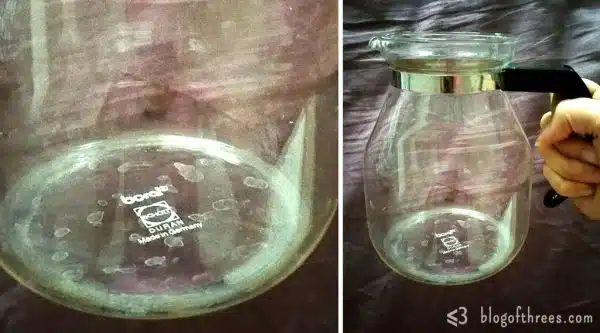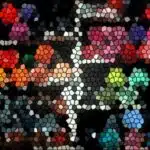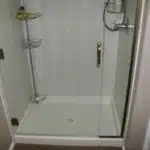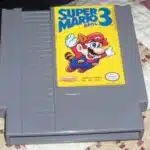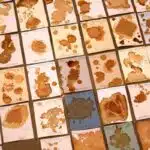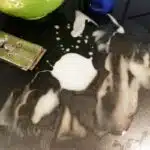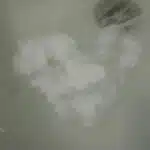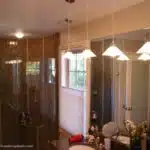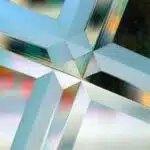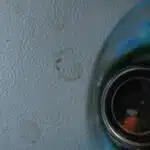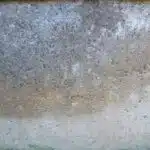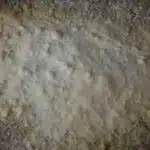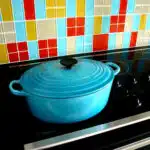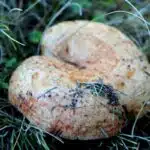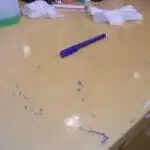Hard water stains on glass surfaces can be a frustrating and unsightly problem for many homeowners. These stains are caused by the buildup of minerals like calcium, magnesium, and iron in the water that leave behind spots and streaks on your windows, shower doors, and other glass surfaces. While it may seem like an impossible task to remove these stubborn stains, there are several effective methods you can use to restore the clarity and shine to your glass.
As a home cleaning expert, I have encountered countless clients who struggle with hard water stains on their glass surfaces. Fortunately, after years of experience and research, I have discovered various proven techniques for removing these stubborn stains. In this article, I will share some of my top tips for removing hard water stains from glass so that you can say goodbye to those unsightly spots once and for all. Whether you’re dealing with shower doors covered in mineral deposits or windows that look cloudy and dull, these methods will help you achieve sparkling clean glass surfaces in no time.
Understanding The Causes Of Hard Water Stains
Glass is a popular material used in homes and commercial spaces for its aesthetic appeal and functionality. It is an ideal option for shower enclosures, windows, mirrors, and tabletops. However, hard water stains can negatively impact the quality and durability of glass surfaces. Understanding the causes of hard water stains is crucial to prevent their occurrence.
Hard water contains a high concentration of minerals such as calcium and magnesium that are deposited on surfaces when the water evaporates. These mineral deposits build up over time and form stubborn stains on glass surfaces. Hard water stains are unsightly and can cause permanent damage if left untreated for extended periods.
The impact of hard water stains on glass quality and durability cannot be understated. They can cause etching, pitting, or scratches on the surface, making them more prone to future damage. Moreover, they make cleaning difficult as regular household cleaners may not be effective in removing them completely. Therefore, it is essential to take preventive measures to avoid the occurrence of hard water stains on glass surfaces.
Identifying The Type Of Glass Surface
- Glass surfaces come in a variety of different types, including tempered glass, laminated glass, and heat-strengthened glass.
- Differentiating between these types of glass surfaces is important, as it helps determine the best course of action when it comes to removing hard water stains.
- Hard water stains can be particularly tricky to remove, as they can adhered to the surface due to the calcium and magnesium present in the water.
- Knowing the type of glass surface you are attempting to clean is the first step to successfully removing hard water stains from glass.
Types Of Glass Surfaces
Glass surfaces come in a variety of forms, each with its own set of cleaning requirements. Understanding the type of glass surface you are dealing with is crucial when it comes to removing hard water stains. Common glass surfaces found in homes include windows, shower doors, and mirrors.
When cleaning windows, it is essential to identify if they are single or double-paned. Double-paned windows have two layers of glass separated by a gas-filled space, making them more fragile and susceptible to damage from acidic cleaners. Single-pane windows can be cleaned with vinegar and water solution or commercial window cleaners. Cleaning frequency depends on location and exposure to elements such as rain or dust.
Shower doors are another common glass surface that can accumulate hard water stains over time. It is important to determine if the shower door has a protective coating, as some coatings can be damaged by abrasive cleaners. Regular cleaning with soap and water can help prevent buildup; for more stubborn stains, try using a mixture of baking soda and vinegar or specialized hard water stain removers.
Differentiating Between Glass Surfaces
Identifying the type of glass surface is crucial when it comes to maintaining its cleanliness and preventing hard water stains. Differentiating between glass surfaces is not only important for cleaning purposes but also for determining which types of glass are suitable for hard water prone areas. As a home cleaning expert, it is important to recognize that some types of glass surfaces are more susceptible to hard water stains than others.
Some types of glass surfaces that should be avoided in hard water prone areas include tempered glass and low-E coated glass. Tempered glass, commonly used in shower doors, cannot be cleaned with abrasive cleaners, as they can cause scratches on the surface. Low-E coated glass, often found in energy-efficient windows, can become damaged by acidic cleaners. Understanding which types of glass surfaces are suitable for specific areas will help prevent damage and ensure proper maintenance.
To prevent hard water stains from forming on glass surfaces, regular maintenance is essential. Tips for preventing buildup include wiping down surfaces after each use, using a squeegee or microfiber cloth to remove excess moisture, and avoiding the use of harsh chemicals or abrasive materials. For more stubborn stains, specialized hard water stain removers or DIY solutions such as vinegar and baking soda can be used. By following these tips and differentiating between various types of glass surfaces, maintaining a clean and clear surface can become a simple task that will ultimately increase the longevity and beauty of your home’s interior design.
Gathering The Necessary Supplies
To effectively remove hard water stains from glass, you will need to gather the necessary supplies. It is essential that you have all the tools and materials before beginning the cleaning process to ensure a smooth and efficient job. You can find these supplies in your local hardware store, home improvement center or online.
Where to buy:
- Hardware stores such as Home Depot or Lowe’s
- Online retailers like Amazon or Walmart.com
- Home improvement centers like Ace Hardware or True Value
When gathering supplies, it is important to consider alternatives to traditional cleaning supplies. For example, vinegar can be an effective substitute for commercial glass cleaners. It is also eco-friendly and inexpensive.
Alternatives to traditional supplies:
- Vinegar
- Baking soda
- Lemon juice
Having gathered all the necessary supplies, you are now ready to move on to preparing the cleaning solution. Remember that attention to detail is key when attempting to remove stubborn hard water stains from glass surfaces.
Preparing The Cleaning Solution
Gathering Supplies: It is necessary to have the right supplies on hand to effectively remove hard water stains from glass. These supplies include a bucket, a cleaning rag, white vinegar, and baking soda.
Mixing Solution: The recommended solution for removing hard water stains from glass is to mix together one cup of white vinegar with two tablespoons of baking soda.
Applying Solution: The solution should be applied to the glass surface with a cleaning rag. Care should be taken to ensure that the solution is spread evenly across the area of the glass that is affected by the hard water stains.
Rinsing: After the solution has been applied, it should be rinsed off with clean, warm water.
Drying: The glass should then be dried with a soft, clean cloth to prevent water spots.
Repeat: If the hard water stains are still visible, the process should be repeated until the glass is clean.
Gathering Supplies
Are you tired of looking at your glass shower doors or windows covered in hard water stains? Don’t worry, with the right supplies and cleaning solution, you can restore their shine. Before preparing the cleaning solution, make sure to gather all necessary supplies to avoid any interruptions during the process.
Choosing appropriate gloves is crucial when dealing with cleaning solutions that contain vinegar. Vinegar is acidic and can cause skin irritation if it comes into contact with bare hands. Therefore, select a pair of gloves made from a material that’s resistant to chemicals like latex or nitrile. These gloves will protect your hands while allowing you to clean effectively.
Selecting the right type of vinegar also plays a significant role in removing hard water stains from glass surfaces. White distilled vinegar is an excellent choice for this task since it contains acetic acid that helps dissolve mineral deposits on glass surfaces. Make sure to buy a quality brand of vinegar since cheaper ones may not be as effective. With these supplies at hand, you’ll be able to prepare an effective cleaning solution that will leave your glass surfaces sparkling clean without damaging them.
Mixing Solution
Once you have gathered all the necessary supplies and protective gear, it’s time to prepare the cleaning solution. While there are many chemical alternatives available in the market, opting for a DIY method is not only cost-effective but also safer for your family and the environment. For this reason, we recommend using a mixture of vinegar and water to remove hard water stains from glass surfaces.
To make the cleaning solution, mix equal parts of white distilled vinegar and water in a spray bottle. Shake well to combine the ingredients thoroughly. You can adjust the measurements depending on how severe the hard water stains are. However, be careful not to add too much vinegar as it may damage your glass surfaces.
It’s important to note that while mixing vinegar with other substances like baking soda or lemon juice may seem like an effective way to remove hard water stains, it can actually do more harm than good. These combinations can create unwanted chemical reactions that may damage your glass surfaces or cause skin irritation. Therefore, sticking with a simple vinegar and water mixture is still the best and safest option for removing hard water stains from glass surfaces.
Applying Solution
After preparing the cleaning solution, it’s time to move on to the next step – applying it onto the glass surface. There are various techniques and effective methods you can use depending on the type of surface you’re working with. For instance, if you’re dealing with a small area, you can spray the solution directly onto the glass and wipe it off with a microfiber cloth. However, for larger areas such as shower doors or windows, you might need to use a squeegee to spread the solution evenly.
When applying the solution, make sure to wear protective gloves and goggles to avoid any skin or eye irritation. Additionally, try not to over-saturate the glass with too much cleaning solution as it may leave streaks or residue behind. Instead, apply just enough solution to cover the affected area and let it sit for a few minutes before wiping it off.
If you find that some hard water stains are particularly stubborn and won’t come off even after applying the vinegar and water mixture, don’t fret! There are other effective methods you could try such as using a specialized glass cleaner or a polishing compound. However, be careful when using these products as they may contain harsh chemicals that could damage your glass surfaces if used improperly.
Using Vinegar And Baking Soda
Preparing the cleaning solution is just the beginning, my dear reader. Now comes the fun part: actually removing those pesky hard water stains from your glass surfaces! Fear not, for I am here to guide you through it all.
First up, let’s talk about using vinegar and baking soda. This method has been tried and tested by countless home cleaning experts and it works like a charm. Simply mix equal parts white vinegar and water in a spray bottle and spritz your glass surface generously. Then, sprinkle some baking soda on top of the wet surface and let it sit for a few minutes. After that, use a non-abrasive sponge or cloth to scrub away the stains. Rinse with water and voila! Your glass will be sparkling clean once again.
But wait, there are alternative methods too! For instance, you can try using lemon juice and salt instead of vinegar and baking soda. Lemon juice contains natural acids that can break down hard water stains while salt acts as an abrasive agent to help scrub them away. Simply cut a lemon in half, dip it in some salt, then rub it over the affected area until the stain disappears. Rinse with water afterwards to remove any leftover residue.
Of course, safety precautions must always be taken when dealing with cleaning solutions. Wear gloves if necessary to protect your hands from harsh chemicals or abrasives. Make sure to keep the area well-ventilated too so you don’t inhale any fumes or dust particles. And remember, always test any new cleaning solution on a small inconspicuous area first before applying it to larger surfaces.
Now that we’ve covered using vinegar and baking soda as well as alternative methods like lemon juice and salt, you’ll be able to tackle those hard water stains on your glass surfaces with ease!
Applying Lemon Juice And Salt
Lemon juice and salt are an effective natural solution for removing hard water stains from glass. The acidic properties of lemon juice work to break down the minerals in the hard water stains, while the abrasive nature of salt helps to scrub away any remaining residue. Lemon juice and salt are also a safe and eco-friendly option compared to harsh chemical cleaners.
One of the benefits of using lemon juice and salt is that it is a cost-effective solution. Both ingredients are commonly found in most households, making it an accessible option for those who don’t want to spend money on expensive cleaning products. Additionally, using natural ingredients like lemon juice and salt reduces the risk of toxic exposure, which can cause respiratory problems or skin irritation.
If you don’t have access to lemon juice or prefer not to use it, there are alternatives that can be used to remove hard water stains from glass. Vinegar mixed with baking soda is one alternative that works similarly to lemon juice and salt. Simply mix equal parts vinegar and baking soda into a paste, apply it onto the hard water stain, let sit for 15-20 minutes, then rinse off with warm water. Another alternative is using rubbing alcohol or hydrogen peroxide directly onto the stained surface before wiping clean with a microfiber cloth.
Next up is trying commercial hard water stain removers. While natural solutions like lemon juice and vinegar work well for minor stains, tougher stains may require a more heavy-duty solution. Commercial cleaners specifically designed for hard water stains can often provide more effective results than natural remedies. However, be sure to follow instructions carefully as these cleaners may contain harsh chemicals that could damage your glass if used improperly.
Trying Commercial Hard Water Stain Removers
Exploring alternatives to traditional cleaning methods is important when tackling hard water stains on glass. Commercial hard water stain removers can be an effective solution for removing stubborn buildup. These products typically contain a combination of acidic and abrasive ingredients that work to dissolve and scrub away the mineral deposits left behind by hard water.
When comparing effectiveness among different commercial hard water stain removers, it’s important to consider the severity of your stains and the type of glass you’re working with. Some products may not be safe for use on certain types of glass, such as tinted or etched glass. It’s also important to carefully follow the instructions on each product, as improper use could result in damage to your glass or even injury to yourself.
Overall, while commercial hard water stain removers can be effective, they are not always necessary for removing mild stains. Less severe buildup can often be removed with a simple vinegar and baking soda solution or a mixture of lemon juice and salt. However, for more stubborn stains that won’t budge with traditional methods, commercial removers may be worth exploring before moving onto more drastic measures like using a scraper for stubborn stains.
Using A Scraper For Stubborn Stains
When dealing with stubborn hard water stains on glass surfaces, sometimes a scraper is necessary to remove the buildup. However, it’s important to use a scraper safely, as glass is prone to scratching if not handled correctly. Before using a scraper, ensure that the surface is wet and soapy to prevent any damage.
Choosing the right type of scraper for your glass surface is also crucial. There are various types of scrapers available in the market such as plastic scrapers, metal scrapers or razor blades. Plastic scrapers are ideal for delicate surfaces like shower doors whereas metal scrapers can be used for heavy-duty cleaning tasks. Razor blades are great for removing small spots but require more skill and experience.
Remember to always exercise caution when using a scraper on glass surfaces. Make sure to keep the blade at a 45-degree angle and avoid putting too much pressure on the surface. With patience and care, you can successfully remove even the most stubborn hard water stains from your glass surfaces using a scraper.
Transitioning into the subsequent section about ‘cleaning with a steam cleaner’, it’s worth noting that while a scraper may work well for some hard water stains, it may not be effective in all cases. For larger or more persistent stains, using a steam cleaner may be necessary. Let’s learn how this powerful tool can help you achieve sparkling clean glass surfaces in no time!
Cleaning With A Steam Cleaner
Steam cleaning is a highly effective and efficient way of cleaning various surfaces in your home. It uses high-temperature steam to remove dirt, grime, and stains without the need for harsh chemicals. One of the benefits of steam cleaning is that it can easily remove hard water stains from glass surfaces.
When choosing the right steam cleaner for your needs, consider the size of the area you will be cleaning and the type of surfaces you will be cleaning. Steam cleaners come in various sizes and designs, including handheld models and larger units with attachments for different surfaces. Look for a model with adjustable steam settings so you can customize the level of heat and pressure based on the surface you are cleaning.
Using a steam cleaner to clean hard water stains from glass is an easy process. Simply fill the tank with water, turn on the unit, and let it heat up until steam starts to emit from the nozzle. Hold the nozzle close to the stained glass surface and move it back and forth until all stains are removed. Once finished, wipe down any excess moisture with a clean cloth.
Transition: Now that we have discussed how to effectively remove hard water stains from glass using a steam cleaner, let’s take a look at some preventative measures that can be taken to avoid future stains.
Preventing Future Hard Water Stains
- Regular cleaning of glass surfaces is an important step in preventing the buildup of hard water stains.
- A range of cleaning agents such as vinegar and detergents are effective for removing hard water stains from glass.
- When using cleaning agents, it is important to ensure that the product is suitable for the glass surface and that the instructions for use are followed correctly.
- Applying a sealant to the glass surface after cleaning can help to protect the glass against future hard water stains.
- There are a variety of sealants available, including water-based and silicone sealants, and it is important to select the most suitable product for the particular glass surface.
- Applying sealant regularly is essential to ensure that the glass surface is adequately protected against hard water stains.
Regular Cleaning
One effective technique for preventing future hard water stains on glass surfaces is regular cleaning. By consistently maintaining a cleaning routine, you can keep your glass looking clean and clear for longer periods of time. However, it is important to note that there are some common mistakes that can hinder the effectiveness of this technique.
When it comes to regular cleaning, many people make the mistake of using harsh chemicals or abrasive materials. These can actually do more harm than good by leaving scratches and etches on the glass surface. Instead, opt for gentle cleaners specifically designed for glass and use a soft cloth or sponge to avoid damaging the surface.
Another common mistake is not drying the surface completely after cleaning. When water droplets are left behind, they can evaporate and leave mineral deposits that lead to hard water stains over time. Be sure to dry all surfaces thoroughly with a clean towel or squeegee to prevent this from happening.
In conclusion, regular cleaning is an effective technique for preventing future hard water stains on glass surfaces. By avoiding common mistakes such as using harsh chemicals or failing to dry surfaces completely, you can maintain beautiful and clear glass in your home with ease.
Cleaning Agents
Preventing future hard water stains on glass surfaces is a common concern for many homeowners. It is crucial to maintain a cleaning routine to keep glass surfaces looking clean and clear for longer periods of time. In this article, we will discuss the best cleaning agents and DIY cleaning solutions that can effectively prevent hard water stains on glass surfaces.
The best cleaning agents for preventing hard water stains are those specifically designed for glass surfaces. They are formulated to dissolve mineral deposits left behind by hard water without damaging the surface of the glass. These cleaning agents come in various forms such as sprays, wipes, and foams. When choosing a cleaning agent, make sure it is recommended for use on glass surfaces.
If you prefer DIY cleaning solutions, there are several options available that can be effective in preventing hard water stains. One popular solution is using white vinegar mixed with water in a 1:1 ratio. Simply spray the solution onto the glass surface and wipe it away with a soft cloth or sponge. Another option is using baking soda mixed with water to create a paste that can be applied to the stained area and wiped away after a few minutes.
In summary, using the best cleaning agents or DIY cleaning solutions can effectively prevent future hard water stains on glass surfaces. By choosing gentle cleaners specifically designed for glass or creating your own solutions at home, you can maintain beautiful and clear glass in your home effortlessly.
Sealants
When it comes to preventing future hard water stains on glass surfaces, using cleaning agents and DIY solutions can be effective. However, there is another option that can provide long-lasting protection against mineral buildup: sealants. Applying a sealant to your glass surface can create a protective barrier that repels water and prevents stains from forming.
The benefits of using sealants are many. Not only do they prevent hard water stains, but they also make cleaning easier by reducing the amount of dirt and grime that sticks to the surface. Additionally, some sealants can provide UV protection and help reduce glare, making them ideal for windows and other glass surfaces exposed to sunlight. However, choosing the right sealant for your glass surface is crucial to ensuring its effectiveness.
When choosing a sealant, consider the type of glass you have (e.g., tempered or laminated) and the location of the surface (e.g., indoor or outdoor). Some sealants may not be suitable for certain types of glass or environments. It’s also important to follow the manufacturer’s instructions carefully when applying the sealant to ensure proper adhesion and longevity. With the right sealant in place, you can enjoy clear and stain-free glass surfaces for years to come.
Maintaining Your Glass Surfaces
To maintain the pristine look of your glass surfaces, it is essential to take proactive steps to prevent hard water stains. However, if you do find yourself with unsightly marks on your glass, don’t worry – there are several effective cleaning techniques that you can use.
Glass cleaning techniques can involve using DIY glass cleaners or commercial products. One popular method is to mix equal parts vinegar and water in a spray bottle and apply it to the affected area. Alternatively, you can create a paste using baking soda and water and apply it with a soft cloth before rinsing thoroughly. It’s important to note that different types of glass may require different cleaning methods, so be sure to check the manufacturer’s instructions before starting.
Maintaining your glass surfaces is not just about removing existing stains; it’s also about preventing future ones from forming. To avoid harsh chemicals, consider using natural remedies such as lemon juice or rubbing alcohol mixed with water. Additionally, make sure to dry your glass thoroughly after each use and avoid leaving standing water on its surface. By following these simple tips and tricks, you can enjoy sparkling clean glass for years to come!
Avoiding Harsh Chemicals
Glass surfaces that have hard water stains can be quite unsightly and difficult to remove. While there are a variety of commercial products available in the market, many of these contain harsh chemicals that can be harmful to both the environment and human health. Fortunately, there are natural alternatives and DIY methods that can be just as effective without posing any risk.
One such alternative is using vinegar, which is a mild acid that can dissolve mineral deposits on glass surfaces. Simply mix equal parts of water and vinegar in a spray bottle and apply it directly onto the stained area. Let it sit for a few minutes before wiping it away with a soft cloth. Another method involves using baking soda mixed with water to form a paste. Apply the paste onto the stained area, let it sit for an hour, then rinse it off with warm water.
When removing hard water stains from glass, it’s important to avoid using harsh chemicals or abrasive cleaners as they can scratch or damage the glass surface. Instead, opt for natural alternatives or DIY methods like those mentioned above. Not only are they safer for you and the environment, but they’re also more cost-effective in the long run.
| Natural Alternatives | DIY Methods | Commercial Products |
|---|---|---|
| Vinegar | Baking Soda | CLR |
| Lemon Juice | White Vinegar | Lime-A-Way |
| Borax | Club Soda | Kaboom |
Protecting your skin and eyes while cleaning is just as important as finding effective cleaning methods. In the next section, we’ll discuss ways to ensure your safety when handling cleaning products.
Protecting Your Skin And Eyes
Proper protection of the skin and eyes is essential to maintaining overall health and well-being. Wearing sunglasses with UV protection is an important step to guard against eye damage from the sun. Applying sunscreen with an SPF of at least 30 is recommended when exposed to direct sunlight for an extended period of time. To remove hard water stains from glass surfaces, a combination of vinegar and water can be used to create a cleaning solution and then scrubbed with a cloth.
Wearing Sunglasses
Protecting your skin and eyes from harmful UV rays is essential for maintaining good health. One of the best ways to protect your eyes is by wearing sunglasses. However, not all sunglasses provide adequate protection against the sun’s harmful rays. It is important to choose the right sunglasses that offer 100% UV protection.
When choosing the right sunglasses, make sure they have a label that says “UV 400” or “100% UV Protection.” This ensures that they block both UVA and UVB rays. You should also look for sunglasses with larger lenses and wrap-around styles, as they provide more coverage for your eyes and surrounding skin.
Once you’ve chosen the right sunglasses, it is important to clean and maintain them properly. You can use a microfiber cloth or lens cleaning solution to remove smudges and dirt from the lenses. Avoid using paper towels or other abrasive materials, as they can scratch the lenses. When not in use, store your sunglasses in a protective case to prevent scratches or damage.
In conclusion, protecting your eyes from harmful UV rays is crucial for maintaining good eye health. By choosing the right sunglasses and properly cleaning and maintaining them, you can ensure that your eyes are protected from the sun’s damaging effects. Remember to always wear your sunglasses when outdoors and invest in a high-quality pair that will last you for years to come.
Sunscreen Application
When it comes to protecting your skin and eyes from harmful UV rays, wearing sunglasses is not enough. You also need to apply sunscreen properly to protect your skin from sun damage. Sunscreen application is an essential part of any skincare routine, especially during the summer months when the sun’s rays are strongest. In this section, we will discuss some tips and tricks for choosing the right sunscreen and applying it correctly.
Choosing the right sunscreen is crucial for effective protection against UV rays. Look for a broad-spectrum sunscreen that provides both UVA and UVB protection with an SPF of at least 30 or higher. It should also be water-resistant if you plan on sweating or swimming. It’s important to note that different skin types may require different types of sunscreen, so choose one that works best for your skin type.
Once you’ve chosen the right sunscreen, it’s time to apply it correctly. The American Academy of Dermatology recommends using one ounce (enough to fill a shot glass) of sunscreen for your entire body and reapplying every two hours or immediately after swimming or sweating heavily. Don’t forget to apply sunscreen on commonly missed areas such as ears, neck, lips, and feet. Sunscreen should be applied at least 15-30 minutes before going outside to allow it to fully absorb into your skin.
By following these tips and tricks for choosing the right sunscreen and applying it correctly, you can ensure that your skin is protected from sun damage all year round. Remember that protecting yourself from harmful UV rays is not just about looking good but also about maintaining good health overall.
Seeking Professional Help
After taking the necessary precautions to safeguard your skin and eyes, it’s time to tackle those stubborn hard water stains on your glass surfaces. But what if you’ve tried all the DIY methods and they simply won’t budge? That’s when you might want to consider seeking professional help.
One of the main advantages of hiring a professional cleaning service is their expertise in dealing with tough stains like hard water marks. They have access to specialized cleaning agents and equipment that can effectively remove these stains without damaging your glass surfaces. Moreover, they can save you time and effort by doing the job quickly and efficiently.
However, before choosing a cleaning service, there are some factors you should consider. First, check their credentials such as licenses and insurance coverage. This will ensure that they are qualified to provide cleaning services and that any damages or accidents during the process will be covered. Additionally, read reviews from previous clients to get an idea of their reputation and reliability. Finally, compare prices from different companies to find one that fits your budget.
With these pros and cons in mind, you can make an informed decision about whether or not to hire a professional cleaning service for your hard water stain problem. Whatever you choose, remember that enjoying sparkling clean glass surfaces requires regular maintenance and care.
Enjoying Your Sparkling Clean Glass Surfaces
As your glass surfaces gleam and shine with newfound clarity, it’s hard not to feel a sense of satisfaction. The process of removing hard water stains from glass can be both challenging and rewarding. With a little bit of elbow grease and some DIY cleaning tips, you’ll soon be admiring the beauty of your sparkling clean glass surfaces.
One natural cleaning solution for removing hard water stains is vinegar. This versatile ingredient is acidic enough to break down mineral deposits without damaging the glass surface. Simply mix equal parts white vinegar and water in a spray bottle, apply to the stained area, let sit for a few minutes, then wipe away with a soft cloth or sponge.
Another effective option is baking soda. Create a paste by mixing baking soda with water until it forms a thick consistency. Apply this paste to the stained areas, rub gently with a soft cloth or sponge, then rinse thoroughly with warm water. Baking soda works by gently scrubbing away mineral deposits while also neutralizing any unpleasant odors.
Maintaining clean glass surfaces can be an ongoing task, but with these natural cleaning solutions at your disposal, you’ll have an easier time keeping your home looking its best. By taking care of your environment through careful cleaning and upkeep, you’re creating an inviting space that others will appreciate as well. Remember to always use gentle techniques when cleaning glass surfaces to avoid scratches or damage, and enjoy the benefits of crystal clear windows and mirrors every day!
Conclusion
Hard water stains on glass can be a frustrating and unsightly problem for homeowners. Understanding the causes of these stains is crucial to effectively removing them. It is also important to identify the type of glass surface and gather the necessary supplies before preparing the cleaning solution.
One interesting statistic to consider is that hard water affects 85% of homes in the United States. This means that a large portion of homeowners are likely struggling with hard water stains on their glass surfaces. Thankfully, there are effective solutions such as using vinegar and baking soda or seeking professional help.
As a home cleaning expert, I recommend avoiding harsh chemicals and protecting your skin and eyes while cleaning glass surfaces. By following these steps, you can enjoy sparkling clean glass surfaces free from hard water stains. Remember, prevention is key – consider investing in a water softener system to prevent future build-up of hard water stains.
Image Credits
- “tea-pot-hard-water-stain” by .fairydust. [ blogofthrees.com ] (featured)

